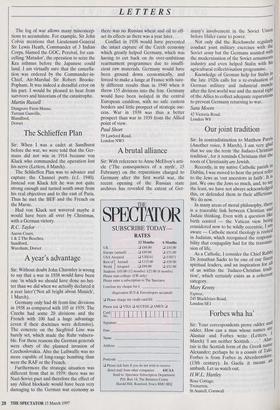A year's advantage
Sir: Without doubt John Charmley is wrong to say that a war in 1938 would have been one 'in which we should have done no bet- ter than we did when we actually declared it a year later'(`Not all bright about Munich', 1 March).
Germany only had 48 front-line divisions in 1938 as compared with 105 in 1939. The Czechs had some 20 divisions and the French with 100 had a huge advantage (even if their doctrines were defensive). The concrete on the Siegfried Line was barely set, which made the Ruhr vulnera- ble. For these reasons the German generals were chary of the planned invasion of Czechoslovakia. Also the Luftwaffe was no more capable of long-range bombing than were the RAF or the French.
Furthermore the strategic situation was different from that in 1939: there was no Nazi-Soviet pact and therefore the effect of any Allied blockade would have been very damaging to the German war economy as there was no Russian wheat and oil to off- set its effects as there was a year later.
Conflict in 1938 would have prevented the intact capture of the Czech economy which greatly helped Germany, which was having to cut back on its over-ambitious rearmament programmes due to insuffi- cient raw materials. Germany would have been ground down economically, and forced to make a lunge at France with sure- ly different results than in 1940 when it threw 155 divisions into the fray. Germany would have been isolated in the central European cauldron, with no safe eastern borders and little prospect of strategic suc- cess. War in 1938 was thus a better prospect than war in 1939 from the Allied point of view.
Paul Short
59 Lawford Road, London NW5


































































 Previous page
Previous page